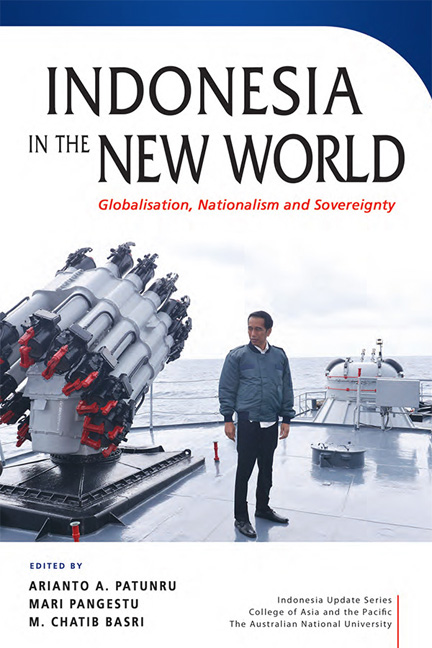Book contents
- Frontmatter
- Contents
- Tables
- Figures
- Contributor
- Acknowledgments
- Glossary
- 1 Challenges for Indonesia in the new world
- PART 1 Globalisation, Nationalism and Sovereignty: the Indonesian Experience
- PART 2 Nationalism in Practice
- PART 3 Impact of and Response to Globalisation
- PART 4 The Human Face of Globalisation
- PART 5 Navigating The New Globalisation
- Index
- INDONESIA UPDATE SERIES
1 - Challenges for Indonesia in the new world
Published online by Cambridge University Press: 08 June 2019
- Frontmatter
- Contents
- Tables
- Figures
- Contributor
- Acknowledgments
- Glossary
- 1 Challenges for Indonesia in the new world
- PART 1 Globalisation, Nationalism and Sovereignty: the Indonesian Experience
- PART 2 Nationalism in Practice
- PART 3 Impact of and Response to Globalisation
- PART 4 The Human Face of Globalisation
- PART 5 Navigating The New Globalisation
- Index
- INDONESIA UPDATE SERIES
Summary
The world is finally recovering from the 2007–08 global financial crisis. After contracting sharply in 2009 and increasing slowly in the subsequent years, world real GDP growth returned to 3 per cent in 2017. Ten years after the crisis, it appears that growth is at last showing sustainable signs of recovery. Other challenges remain, however. Trade growth has slowed and, despite an improvement in 2017, remains lower than before the global financial crisis. The slowdown in trade growth has been attributed to cycli¬cal factors and to structural factors such as a lack of productivity growth and the maturation of global value chains. Protectionism is another factor, although, to date, it is not so much the increase in protectionist measures as the high level of uncertainty about trade policy that is affecting trade.
The policy uncertainty stems primarily from the perceived lack of ben¬efits from globalisation. Almost half the world's population—that is, more than 3 billion people—have to survive on $2.50 or less every day. The richest 10 per cent of the global population owns more than 85 per cent of the global wealth. Inequality has increased even in the countries where poverty has declined. These factors are widely seen as the main causes of the re-emergence of anti-globalisation sentiment around the world, prompting leaders to adopt populist and inward-looking policies. The electoral consequences have been surprising; they include the election of Rodrigo Duterte in the Philippines, the success of the ‘leave’ campaign in the Brexit referendum in the United Kingdom and the election of Donald Trump in the United States. Meanwhile, those in power show an increas¬ingly authoritarian inclination—Erdoğan in Turkey, Putin in Russia and Xi in China, to name a few—often by exploiting the public's misgivings about globalisation.
In Indonesia, the discontent with globalisation is apparent in rising nationalism, a rejection of foreign interference and a distrust of democracy that is reminiscent of the New Order. The disappointment with globalisa¬tion is not entirely unjustified. In Indonesia as in many other countries, globalisation has had both good and bad results. Trade always creates both winners and losers, and in the absence of a well-functioning com¬pensation mechanism and the free movement of labour across sectors, the winners appear to be concentrated disproportionately among a small number of elites. Corruption has only worsened this situation, allow¬ing the dark side of globalisation to dominate.
- Type
- Chapter
- Information
- Indonesia in the New WorldGlobalisation, Nationalism and Sovereignty, pp. 1 - 14Publisher: ISEAS–Yusof Ishak InstitutePrint publication year: 2018

